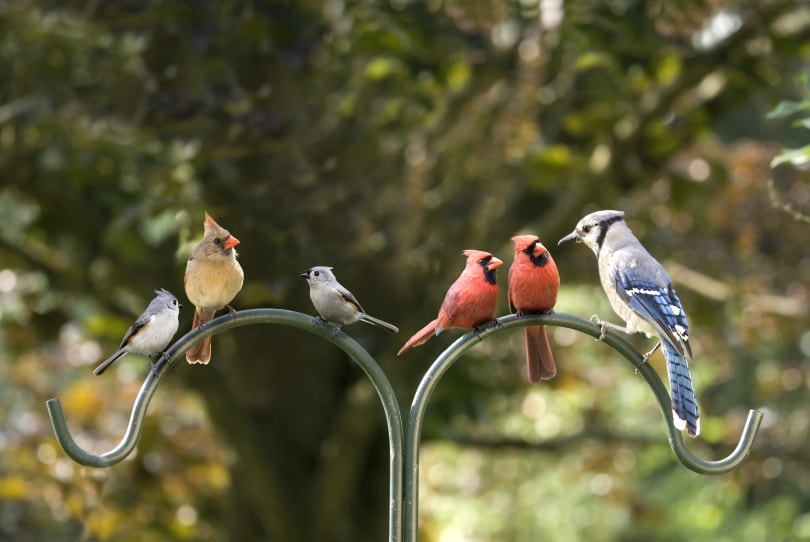8 Smells that Birds HATE & How To Use Them
Last Updated on

If you have birds hanging around your garden, finding the best way to keep them away can be a chore. After all, you probably don’t want to hurt or kill birds—you’d just like them to leave your plants alone. One effective way of managing birds is through an area or olfactory repellent. You can buy chemical repellents, but many natural repellents also encourage birds to fly elsewhere. Here are eight common suggestions for repelling birds using easy-to-find ingredients.

The 8 Smells That Birds Hate
1. Peppermint

Birds don’t like strong smells, and peppermint is a great example. The strong, fresh minty scent is likely to be inoffensive to human noses, but birds and insects can’t stand the smell and will avoid it. Peppermint essential oil is a great option that is readily available and concentrates the scent even further. Peppermint oils can be dangerous to small animals in large quantities, but the amount that a bird will get from checking out your repellent is minimal.
2. Basil

Basil is often recommended to repel bugs and insects, but its sharp, strong scent can work on birds too. For basil, the key is to make sure the scent is strong enough—a faint whiff won’t upset birds, but a powerful smell of basil is likely to scare them off. Some gardeners even swear by planting basil throughout their garden to keep birds and unwanted insects away. Basil also can be fairly mild in scent, although it might make you hungry!
3. Garlic

They say that garlic repels vampires, but the truth is that it repels most things. Garlic cloves have a strong smell and are easy to scatter throughout your garden—just keep an eye on them, so they don’t rot or sprout! Garlic oils can also be used in your garden if you’d rather not use whole cloves. Whatever you use, the strong scent of garlic will keep away most animals and insects, including birds.
4. Cayenne Pepper

Cayenne pepper is used in lots of recipes because it packs a strong punch, so it’s not surprising that birds can’t stand the smell. Dried peppers or oils are a great option for spreading that smell throughout your garden and repelling birds and animals. Just be careful when handling peppers and make sure you wash your hands afterwards—if you touch your eye after handling cayenne peppers, you’ll know why birds stay away.
5. Chili Pepper

Chili pepper is another pepper option that can be used to keep gardens bird-free. Chili peppers aren’t the strongest peppers, and they can be hard to apply properly. One online source suggests soaking peppers in a mixture of water and vinegar and then spraying it around your yard once the peppers have permeated the water.
6. Vinegar

Vinegar has a sharp, acrid smell that birds hate. It’s a little less ideal because most of us humans don’t love the smell either, but it is still a good choice for protecting plants. White vinegar and apple cider vinegar are both good options for keeping away birds. Try spraying vinegar over surfaces or soaking cotton balls in vinegar to keep birds out. You’ll have to reapply regularly as the smell doesn’t last especially long.
7. Citronella

Citronella oil is a common essential oil extracted from lemongrass. It has a lemony, fresh scent that’s often associated with cleaning products, but that’s not it’s only use. Citronella oil actually repels mosquitos and small animals, including birds. Citronella oil is easy to find, and you can also buy citronella candles. These candles are meant to repel mosquitos, but they’ll also keep birds away while they’re burning. If you just want to keep your area bird-free while you’re using it, a citronella candle is a good choice.
8. Tea Tree Oils

A final essential oil option is tea tree oil. Tea tree oil has a strong scent, and it’s often used in shampoos and body care products. Although the smell doesn’t bother us, it can keep away birds. One caution: it’s important to keep tea tree oil out of the reach of pets, as it can cause poisoning in cats and dogs. If you use this oil, it’s best to use it up high so that pets won’t be in danger.
How to use Scent-Based Repellents
There are lots of options to make use of scent-based repellents. For some of the items on this list, you can use a fresh plant—for example, by planting mint or by scattering garlic cloves in your flower bed. Many of these scents are available as essential oils. If this is the case, try soaking cotton balls in the oil and leaving them in strategic spots. A rag soaked in oil works as well. Either way, you’ll want to reapply regularly as the scent fades. This method also works for vinegar. You can also make a homemade spray using a mixture of water, vinegar, and scent. This fades quickly, but it is easy to make and doesn’t take long to apply.
Pros and Cons of Scent-Based Repellents
Scent-based repellents are nice because they clear out a whole area at once. While other repellents require you to carefully consider everywhere a bird might go, concentrating enough scent-based repellent in an area makes the whole garden undesirable. However, there are some downsides.
First, many scent-based repellents need frequent reapplication. They might last for a few days or weeks before needing a refresh. Second, they often bank on the smell being unpleasant enough to deter attention—but if you have a tempting enough treat, birds might overcome their dislike of the scent. Finally, these repellents are generally noticeable to humans. If you hate the smell of vinegar, using it to keep birds out of your garden will punish you, too.
Featured Image Credit: SAJE, Shutterstock
About the Author Chelsea Mortensen
Chelsea Flake Mortensen has a BA in English and Creative Writing from Brigham Young University. Chelsea is a writer with a passion for animals having grown up around everything from cats and birds to chameleons and fish. She now writes about a variety of topics.
Related Articles:
How to Collimate Binoculars: 9 Expert Tips
How to Clean a Refractor Telescope: Step-by-Step Guide
How to Clean a Telescope Eyepiece: Step-by-Step Guide
How to Clean a Rifle Scope: 8 Expert Tips
When Were Binoculars Invented? History, Today & Future
Can You Use Binoculars to Look At Stars? How to Choose the Right Pair
How to Choose Binoculars for Bird Watching: 10 Expert Tips
Monocular vs Telescope: Differences Explained (With Pictures)
